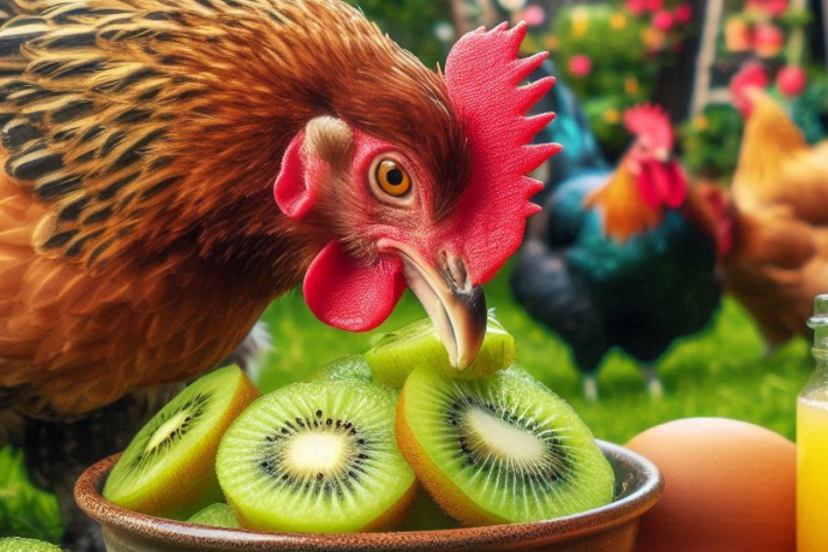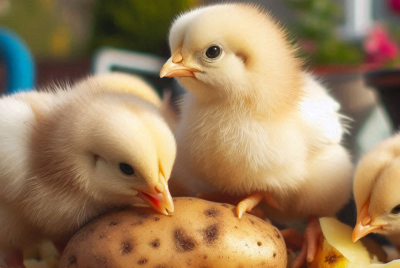Can Chickens Eat Kiwi? A Comprehensive Guide
Introduction
Can Chickens Eat Kiwi?
Have you ever wondered if chickens can eat kiwi? As someone who’s been raising chickens for a while, I had the same question. Kiwi is a tasty and nutritious fruit for us, but what about our feathered friends? In this article, I’ll share my personal experience and provide helpful tips on feeding kiwi to chickens, including its benefits, potential risks, and some handy suggestions. By the end of this guide, you’ll know everything there is to know about incorporating kiwi into your chickens’ diet safely and effectively.
Nutritional Value of Kiwi
Vitamins and Minerals
Kiwi is packed with essential vitamins and minerals. It’s a great source of Vitamin C, Vitamin K, Vitamin E, and folate. Additionally, kiwi contains potassium, fiber, and antioxidants, all of which can contribute to the overall health of your chickens.
1. Vitamin C: This powerful antioxidant helps boost the immune system, reducing the likelihood of illnesses and infections.
2. Vitamin K: Essential for blood clotting and bone health, ensuring your chickens maintain strong bones and a healthy circulatory system.
3. Vitamin E: Important for reproductive health and protecting cells from damage, which can improve the longevity and productivity of your flock.
4. Folate: Helps with DNA synthesis and repair, crucial for growth and development, especially in younger chickens.
5. Potassium: Regulates fluid balance and muscle contractions, vital for overall health and well-being.
Benefits for Chickens
These nutrients can help boost your chickens’ immune systems, improve their feather health, and aid in digestion. But is kiwi safe for them to eat?
1. Immune Support: The high Vitamin C content helps fortify the immune system, making chickens more resistant to diseases.
2. Feather Quality: Vitamin E and antioxidants contribute to healthier, shinier feathers, crucial during molting seasons.
3. Digestive Health: Fiber aids digestion, promoting a healthy gut and preventing issues like constipation.
4. Bone Health: Vitamin K and potassium ensure strong bones, reducing the risk of fractures and other skeletal issues.
5. Reproductive Health: Vitamin E supports reproductive functions, which can improve egg quality and production.
Is Kiwi Safe for Chickens?

Edible Parts of Kiwi
Yes, kiwi is generally safe for chickens, but it’s important to feed it in moderation. Chickens can eat the flesh of the kiwi fruit. While the skin is edible, it’s best to avoid it as it can be tough for chickens to digest. The seeds are also safe but should be given in limited amounts.
1. Flesh: Soft and easy to digest, the flesh is the most nutritious part for chickens.
2. Skin: Although edible, the skin is tough and can be hard for chickens to digest. It’s best to peel the kiwi.
3. Seeds: Safe in small amounts, but avoid giving too many as they can be difficult to digest.
4. Core: The core is generally soft and safe to eat, but ensure it’s cut into small, manageable pieces.
5. Juice: Fresh kiwi juice can be a refreshing treat, but only in small quantities to avoid sugar overload.
Potential Risks
Feeding too much kiwi can cause digestive issues due to its high fiber content. Also, be cautious if your chickens have never had kiwi before; introduce it slowly to avoid any potential allergic reactions.
1. Digestive Upset: Excess fiber can lead to diarrhea or other digestive issues.
2. Allergic Reactions: Although rare, some chickens might be allergic to kiwi. Watch for signs like swelling, difficulty breathing, or changes in behavior.
3. Sugar Content: Kiwi contains natural sugars that can cause weight gain if fed in large amounts.
4. Choking Hazard: Large pieces can be a choking hazard. Always cut kiwi into small, manageable pieces.
5. Pesticides: Ensure the kiwi is thoroughly washed to remove any pesticide residues that could harm your chickens.
How to Feed Kiwi to Chickens
Preparation Steps
1. Wash the Kiwi: Ensure the kiwi is clean to remove any pesticides or dirt.
2. Peel the Kiwi: While the skin is edible, it’s tough and can be difficult for chickens to digest.
3. Cut into Small Pieces: This makes it easier for the chickens to eat and reduces the risk of choking.
4. Check for Ripeness: Ensure the kiwi is ripe but not overripe. Overripe kiwi can ferment and cause digestive issues.
5. Serve Fresh: Always serve fresh kiwi to ensure your chickens are getting the maximum nutritional benefits.
Feeding Tips
1. Start Slowly: Introduce kiwi gradually to avoid overwhelming their digestive systems.
2. Mix with Regular Feed: Combine kiwi with their regular feed to ensure a balanced diet.
3. Observe Reactions: Watch for any signs of digestive upset or allergic reactions.
4. Limit Portions: Offer kiwi as a treat, not as a staple food. Small, frequent treats are better than large amounts at once.
5. Rotate Fruits: Alternate kiwi with other fruits to provide a variety of nutrients and prevent overconsumption of any one type.
Benefits of Kiwi for Chickens
Boosting Immunity
The high Vitamin C content in kiwi can help strengthen your chickens’ immune systems, making them more resistant to diseases.
1. Disease Resistance: A stronger immune system helps chickens fight off common poultry diseases.
2. Reduced Vet Visits: Healthier chickens mean fewer trips to the vet, saving you time and money.
3. Faster Recovery: If your chickens do get sick, a robust immune system can speed up recovery.
4. Better Overall Health: Regular intake of Vitamin C supports overall well-being and vitality.
5. Increased Lifespan: Healthier chickens are likely to live longer, more productive lives.
Enhancing Feather Health
Vitamin E and antioxidants present in kiwi contribute to healthier, shinier feathers, which is particularly beneficial during molting season.
1. Shinier Feathers: Antioxidants help maintain the luster and health of feathers.
2. Quicker Molting: Vitamin E supports faster and healthier molting cycles.
3. Stronger Feathers: Improved nutrition leads to stronger, more resilient feathers.
4. Color Enhancement: Nutrient-rich diets can enhance the natural color and vibrancy of feathers.
5. Reduced Feather Loss: Healthier feathers mean less shedding and a fuller, more attractive plumage.
Improving Digestion
The fiber in kiwi aids digestion and can help prevent digestive issues like constipation. Just remember to feed it in moderation to avoid the opposite effect!
1. Regular Bowel Movements: Fiber promotes regular, healthy bowel movements.
2. Prevent Constipation: A fiber-rich diet can help prevent constipation in chickens.
3. Healthy Gut Flora: Fiber supports a healthy balance of gut bacteria.
4. Better Nutrient Absorption: Improved digestion means better absorption of nutrients.
5. Reduced Digestive Problems: A well-functioning digestive system reduces the risk of digestive disorders.
Possible Downsides of Feeding Kiwi to Chickens
Overfeeding Issues
Too much kiwi can lead to digestive upset due to its high fiber content. Moderation is key to avoiding diarrhea or other gastrointestinal issues.
1. Diarrhea: Excessive fiber can cause diarrhea, leading to dehydration and nutrient loss.
2. Weight Gain: High sugar content can contribute to weight gain if fed in large amounts.
3. Nutrient Imbalance: Overfeeding kiwi can upset the balance of nutrients in their diet.
4. Dependence on Treats: Chickens might develop a preference for treats over their regular feed.
5. Cost: Feeding large amounts of kiwi can become expensive and unsustainable.
Allergic Reactions
While rare, some chickens might be allergic to kiwi. Watch for any signs of discomfort or unusual behavior after introducing kiwi to their diet.
1. Swelling: Look for swelling around the beak or eyes as a sign of an allergic reaction.
2. Difficulty Breathing: Respiratory issues can indicate an allergy.
3. Behavioral Changes: Lethargy or unusual behavior might suggest an allergic reaction.
4. Digestive Distress: Vomiting or severe diarrhea can be signs of an allergy.
5. Immediate Action: If you notice any of these signs, remove kiwi from their diet and consult a veterinarian.
Alternatives to Kiwi for Chickens
Other Fruits Chickens Can Eat
Chickens can enjoy a variety of fruits such as apples (without seeds), berries, bananas, and melons. These fruits provide similar benefits and can be rotated to ensure a balanced diet.
1. Apples: Rich in fiber and Vitamin C. Make sure to remove the seeds as they contain cyanide.
2. Berries: Blueberries, strawberries, and raspberries are packed with antioxidants and vitamins.
3. Bananas: A great source of potassium and natural sugars. Feed in moderation to avoid sugar overload.
4. Melons: Watermelon, cantaloupe, and honeydew are hydrating and nutritious, especially during hot weather.
5. Grapes: Easy to eat and full of vitamins. Cut them into smaller pieces to prevent choking.
Balancing the Diet
While fruits are a great treat, they should not replace the main components of a chicken’s diet. Ensure your chickens have a balanced diet that includes grains, vegetables, and protein sources.
1. Grains: Corn, wheat, and barley are essential for energy and overall health.
2. Vegetables: Leafy greens like spinach, kale, and lettuce provide vital nutrients and minerals.
3. Protein Sources: Insects, mealworms, and legumes are great sources of protein necessary for growth and egg production.
4. Calcium: Oyster shells or crushed eggshells help with eggshell formation and bone health.
5. Fresh Water: Always ensure your chickens have access to clean, fresh water to stay hydrated and healthy.
Personal Recommendations
My Experience with Kiwi and Chickens
In my experience, chickens do enjoy the occasional kiwi treat. I noticed an improvement in their overall vitality and feather condition. However, I always ensure to feed kiwi sparingly and mix it with other fruits and regular feed to maintain a balanced diet.
1. Observation: Keep an eye on how your chickens react to new foods. Look for any changes in behavior or health.
2. Variety: Offer a variety of fruits and vegetables like green beans to ensure a well-rounded diet.
3. Moderation: Treats should make up a small portion of their diet. Balance is key to their health.
4. Routine: Establish a feeding routine to avoid overfeeding and ensure all chickens get their fair share.
5. Consult a Vet: If you’re ever unsure about a new food, consult a veterinarian for advice.
Conclusion
In conclusion, kiwi can be a nutritious and tasty treat for your chickens when fed in moderation. It provides essential vitamins and minerals that can boost their health, but be mindful of the potential risks. Always introduce new foods gradually and watch for any adverse reactions. With proper care and a balanced diet, your chickens can enjoy the benefits of kiwi and other fruits.
FAQs
1. Can chickens eat kiwi skin?
It’s best to avoid feeding kiwi skin to chickens as it can be tough to digest.
2. How much kiwi can I give to my chickens?
Start with small amounts, like a few pieces, and observe their reaction. Moderation is key.
3. Can baby chicks eat kiwi?
It’s best to avoid feeding kiwi to baby chicks as their digestive systems are more sensitive.
4. Are there any fruits chickens should avoid?
Yes, avoid feeding chickens citrus fruits, avocado, and fruit seeds or pits as they can be toxic.
5. Can kiwi improve egg quality?
While kiwi can contribute to overall health, it should be part of a balanced diet for the best egg quality.
*We may earn a commission from purchases made through our links, at no cost to you. This does not affect our product recommendations. Please see our disclosure to learn more.




